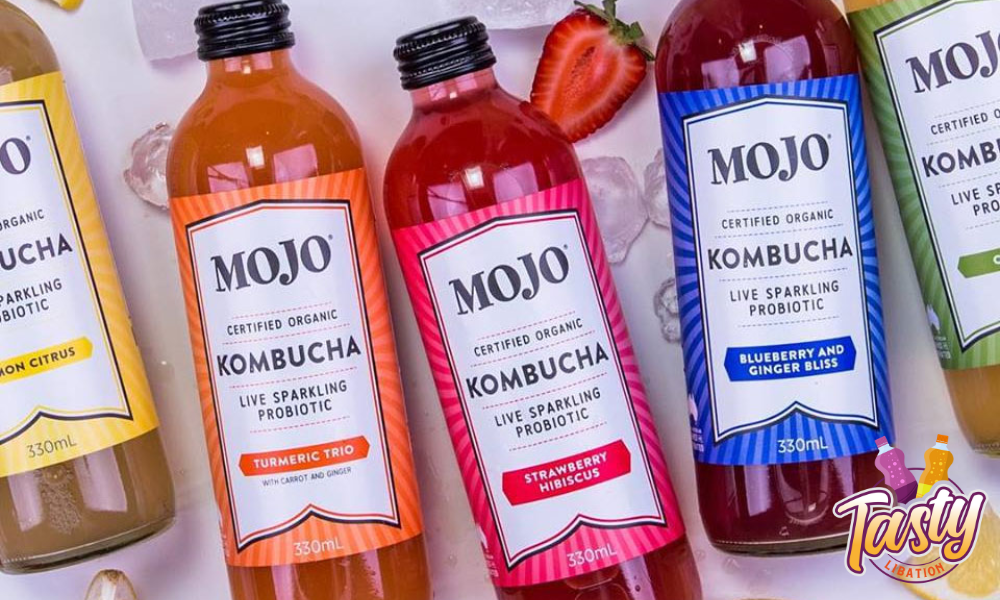Have you ever heard of kombucha? It’s a fermented tea that’s gained much popularity recently for its supposed health benefits. But is kombucha as good for you as people say?
In this article, we’ll be taking a closer look at the supposed benefits of kombucha and answering some common questions, such as: Is kombucha healthy for you? Does it make you go poo? Is it hard on your kidneys? Is it bad for your liver? Does it detox your body?
So grab a bottle of kombucha (or not), and let’s dive in!
Is kombucha Healthy For You?
Although kombucha is frequently promoted as a healthy substitute for soda and other sugary beverages, is it beneficial to your health? Let’s get started and find out!
It’s crucial to remember that kombucha is created by fermenting sweetened tea with a symbiotic colony of bacteria and yeast (also known as a SCOBY). Acetic acid, probiotics, and antioxidants are just a few of the beneficial substances that are produced during the fermentation process.
The presence of probiotics in kombucha is one of its key advantages. Probiotics are living bacteria and yeast comparable to the good bacteria in your stomach. They can aid in enhancing digestion, bolstering immunity, and even treating some digestive diseases.
Antioxidants, substances that can help shield your cells from damage by free radicals, are also abundant in kombucha. Free radicals are unstable chemicals that can damage the tissues in your body and are thought to be a factor in the emergence of chronic diseases like cancer and heart disease.
In addition to having probiotics and antioxidants, some individuals think kombucha can aid in detoxification, weight loss, and even mental clarity. It’s significant to highlight that these statements are only partially supported by scientific research.
The fact that kombucha has trace levels of alcohol—typically 0.5% or less—could be a cause for worry. It’s essential to note if you’re sensitive to alcohol or pregnant, even if this level of alcohol is generally thought to be modest.
It’s also worth noting that kombucha can be a bit of a mixed bag regarding its sugar content. Some kombucha brands contain a lot of sugar, while others are much lower in sugar. It’s always a good idea to check the label and choose a brand that has a lower sugar content if you’re concerned about your sugar intake.
So, kombucha, is it good for you?
Kombucha can be a beneficial supplement to your diet when used in moderation. It’s a fantastic source of probiotics and antioxidants and might also benefit your health. However, it’s always a good idea to read the label and pick a brand with less sugar while also being aware that it contains very little alcohol.
It’s crucial to use kombucha in moderation and as part of a balanced, nutritious diet, as with everything else.
Does Kombucha Make You Go Poo?

So, does kombucha make you go poo? The short answer is maybe. As with any food or drink, it can affect everyone differently. Some people may experience an increase in bowel movements after drinking kombucha, while others may not notice any change.
One potential reason for this is the probiotics found in kombucha. Probiotics are live microorganisms that are similar to the beneficial bacteria found in your gut. These microorganisms can help balance the bacteria in your intestine, which may help improve digestion and regularity.
However, it’s important to note that not all probiotics are created equal, and the specific strains found in kombucha may not necessarily have a substantial effect on bowel movements for everyone.
Additionally, kombucha contains small amounts of caffeine and alcohol, which can also have a laxative effect on some people. However, the amount of caffeine and alcohol in kombucha is usually minimal and may not be enough to cause a noticeable change in bowel movements for most people.
So, while kombucha may slightly affect bowel movements for some people, it’s not a guaranteed side effect for everyone. If you’re interested in trying kombucha for its potential digestive benefits, it’s essential to pay attention to how your body reacts and listen to your own experience.
It’s also worth noting that kombucha is generally considered safe to drink in moderation, but it’s not for everyone. Some people may be allergic to the ingredients in kombucha or may have a sensitivity to the caffeine or alcohol it contains. If you have any concerns about trying kombucha, it’s always a good idea to talk to your doctor before adding it to your diet.
Is kombucha Hard On The Kidneys?
Is kombucha hard on the kidneys? The short answer is no. There is no evidence to suggest that kombucha is harmful to the kidneys. In fact, some studies have even shown that kombucha may have kidney-protective effects.
One study published in the Journal of Food Science and Technology found that kombucha tea has antioxidant and anti-inflammatory properties that may help prevent kidney damage caused by oxidative stress. Another study published in the Journal of Renal Care found that kombucha helped reduce inflammation and improve kidney function in rats with chemically induced kidney damage.
That being said, it’s important to remember that kombucha is still a fermented drink, and, like any fermented product, it contains trace amounts of alcohol. The alcohol content in kombucha is usually very low, typically around 0.5% or less, but it’s still important to keep this in mind if you have liver or kidney problems or are taking medications that could interact with alcohol.
It’s always a good idea to check with your healthcare provider before incorporating any new food or drink into your diet, especially if you have any underlying health conditions.
Another thing to consider is the sugar content in kombucha. Many commercial kombucha brands contain added sugars to make the drink more palatable, and consuming too much-added sugar can adversely affect your health, increasing your risk of kidney disease.
If you’re concerned about sugar intake, look for kombucha brands made with minimal or no added sugars, or try making your kombucha at home using unsweetened tea.
Is Kombucha Bad For Your Liver?

Some studies have suggested that kombucha may have liver-protective effects, while others have found that it may potentially cause liver damage.
One study published in the Journal of Food Science and Technology found that kombucha could reduce liver damage in mice induced by chemical toxins. Another study published in the Journal of Agricultural and Food Chemistry found that kombucha was able to inhibit the formation of fat in the livers of mice, potentially indicating a potential benefit for those with non-alcoholic fatty liver disease.
On the other hand, there have been a few cases where people have experienced liver damage after consuming large amounts of kombucha. In one case report, a woman developed acute hepatitis (liver inflammation) after drinking about 16 ounces of kombucha daily for several months.
Another case report described a woman who developed liver damage after consuming about 4 ounces of kombucha daily for several months. It’s worth noting that in both of these cases, the individuals also took other medications that may have contributed to their liver damage.
So, what does all of this mean? Well, more research is needed to understand the potential effects of kombucha on the liver fully.
However, it’s also essential to remember that moderation is vital in any food or beverage. While kombucha may have some potential health benefits, it’s probably a good idea to limit your consumption to a glass or two per day to be on the safe side.
Does Kombucha Detox Your Body?
Some evidence suggests that kombucha can help support liver function, which is responsible for detoxifying the body. The liver is a vital organ that filters out toxins and waste products from the body, and a healthy liver is essential for maintaining overall health. Some bacteria and yeast in kombucha may help stimulate the liver’s detoxification process and support its function.
However, it’s important to note that the liver is an incredibly efficient organ and is capable of detoxifying the body on its own without the help of kombucha or any other specific food or drink. Additionally, there is limited scientific research on the specific effects of kombucha on the liver and its detoxification capabilities, so it’s hard to say how much of an impact it truly has.
It’s also worth mentioning that while kombucha does contain antioxidants, which can help protect the body against harmful toxins, it is not a magic cure-all for detoxing. No single food or drink can completely rid the body of toxins – it’s a complex process that involves a healthy diet, regular exercise, and proper hydration.
Conclusion
Kombucha can be a tasty and potentially healthy addition to your diet. While more research is needed to understand its effects fully, it appears to have many potential benefits, including aiding in digestion and potentially even helping to detox the body.
So next time you’re craving a refreshing drink, consider giving kombucha a try. Just be sure to listen to your body and stop consuming it if you experience adverse side effects.








